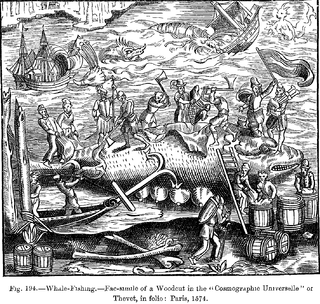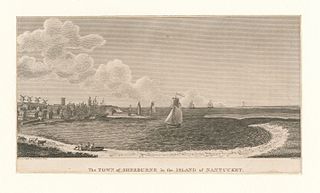
Nantucket is an island about 30 miles (48 km) south from Cape Cod. Together with the small islands of Tuckernuck and Muskeget, it constitutes the Town and County of Nantucket, a combined county/town government in the state of Massachusetts, USA. Nantucket is the southeasternmost town in both Massachusetts and the New England region. The name "Nantucket" is adapted from similar Algonquian names for the island.

New Island is one of the Falkland Islands, lying north of Beaver Island. It is 238 km (148 mi) from Stanley and is 13 km (8.1 mi) long with an average width of 750 m (820 yd). The highest point is 226 metres (741 ft). The northern and eastern coasts have high cliffs but the eastern coasts are lower lying, with rocky shores and sandy bays. There are several smaller offshore islands in the group; North Island and Saddle Island have high cliffs but Ship Island and Cliff Knob Island are lower lying.

This article discusses the history of whaling from prehistoric times up to the commencement of the International Whaling Commission (IWC) moratorium on commercial whaling in 1986. Whaling has been an important subsistence and economic activity in multiple regions throughout human history. Commercial whaling dramatically reduced in importance during the 19th century due to the development of alternatives to whale oil for lighting, and the collapse in whale populations. Nevertheless, some nations continue to hunt whales even today.

Essex was an American whaling ship from Nantucket, Massachusetts, which was launched in 1799. On November 20, 1820, while at sea in the southern Pacific Ocean under the command of Captain George Pollard Jr., the ship was attacked and sunk by a sperm whale. About 2,000 nautical miles (3,700 km) from the coast of South America, the 20-man crew was forced to make for land in three whaleboats with what food and water they could salvage from the wreck.

Scrimshaw is scrollwork, engravings, and carvings done in bone or ivory. Typically it refers to the artwork created by whalers, engraved on the byproducts of whales, such as bones or cartilage. It is most commonly made out of the bones and teeth of sperm whales, the baleen of other whales, and the tusks of walruses.
The cetology in Herman Melville's 1851 novel, Moby-Dick, is a running theme that appears most importantly in Ishmael's zoological classification of whales, in Chapter 32, "Cetology". The purpose of that chapter, the narrator says, is "to attend to a matter almost indispensable to a thorough appreciative understanding of the more special leviathanic revelations and allusions of all sorts which are to follow." Further descriptions of whales and their anatomy occur in seventeen other chapters, including "The Sperm Whale's Head -- Contrasted View" and "The Right Whale's Head -- Contrasted View".

Owen Chase was first mate of the whaler Essex, which sank in the Pacific Ocean on November 20, 1820, after being rammed by a sperm whale. Soon after his return to Nantucket, Chase wrote an account of the shipwreck and the attempts of the crew to reach land in small boats. The book, Narrative of the Most Extraordinary and Distressing Shipwreck of the Whale-Ship Essex, was published in 1821 and would inspire Herman Melville to write Moby-Dick.

Nathaniel Philbrick is an American author of history, winner of the National Book Award, and a finalist for the Pulitzer Prize. His maritime history, In the Heart of the Sea: The Tragedy of the Whaleship Essex, is based on what inspired Herman Melville to author Moby-Dick, won the 2000 National Book Award for Nonfiction and was adapted as a film in 2015.

Commercial whaling in the United States dates to the 17th century in New England. The industry peaked in 1846–1852, and New Bedford, Massachusetts, sent out its last whaler, the John R. Mantra, in 1927. The Whaling industry was engaged with the production of three different raw materials: whale oil, spermaceti oil, and whalebone. Whale oil was the result of "trying-out" whale blubber by heating in water. It was a primary lubricant for machinery, whose expansion through the Industrial Revolution depended upon before the development of petroleum-based lubricants in the second half of the 19th century. Once the prized blubber and spermaceti had been extracted from the whale, the remaining majority of the carcass was discarded.

Sperm whaling is the human practice of hunting sperm whales, the largest toothed whale and the deepest-diving marine mammal species, for the oil, meat and bone that can be extracted from the cetaceans' bodies.

The Nantucket Whaling Museum is a museum located in Nantucket, Massachusetts, United States. It is run by the Nantucket Historical Association. The Whaling Museum is the flagship site of the Nantucket Historical Association’s fleet of properties.
Samuel Enderby & Sons was a whaling and sealing company based in London, England, founded circa 1775 by Samuel Enderby (1717–1797). The company was significant in the history of whaling in the United Kingdom, not least for encouraging their captains to combine exploration with their business activities, and sponsored several of the earliest expeditions to the subantarctic, Southern Ocean and Antarctica itself.
The whaler Globe, of Nantucket, Massachusetts, was launched in 1815. She made three whaling voyages and then in 1824, on her fourth, her crew mutinied, killing their officers. Eventually most of the mutineers were killed or captured and the vessel herself was back in Nantucket in her owners' hands. She continued to whale until about 1828. She was broken up circa 1830.

In the Heart of the Sea is a 2015 historical adventure drama film directed and co-produced by Ron Howard from a screenplay by Charles Leavitt and a story by Leavitt, Rick Jaffa, and Amanda Silver. An international co-production between the United States and Spain, the film stars Chris Hemsworth, Benjamin Walker, Cillian Murphy, Tom Holland, Ben Whishaw, and Brendan Gleeson. It is based on Nathaniel Philbrick's 2000 non-fiction book In the Heart of the Sea: The Tragedy of the Whaleship Essex, about the sinking of the American whaling ship Essex in 1820, an event that in part inspired Herman Melville's 1851 novel Moby-Dick.
Micajah Coffin was an American mariner, triangle trader, and politician who served as a member of the Massachusetts House of Representatives.

Uda Bay is a bay in Khabarovsk Krai, Russian Federation.

The citizens of Nantucket during the American Revolutionary War era relied on whaling, industries that supported whaling, and the trade in oil that resulted from that industry. Because most of this trade was with England, the leading citizens of Nantucket chose to be neutral during the American Revolutionary War, siding neither with those who supported revolution nor with the British Crown, in order to maintain the viability of the island's economy. The Quaker culture of pacifism was a secondary cause of the island's non-participation in revolutionary activities.
Renown was launched in 1794 at New Bedford, Massachusetts. She made four voyages from Nantucket as a whaler. In 1813, while she was on her fifth American whaling voyage, she became the first American whaler that British whalers captured in the South Seas. She was sold in London and under the name Adam became first a London-based transport and then a whaler in the British southern whale fishery. She made four whaling voyages and was wrecked in 1825 at the outset of her fifth British whaling voyage.












